would rather语法
would rather虚拟语气的用法归纳
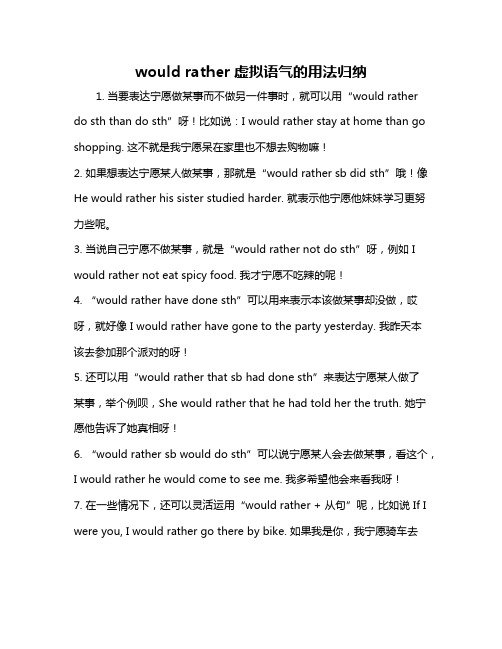
would rather虚拟语气的用法归纳1. 当要表达宁愿做某事而不做另一件事时,就可以用“would rather do sth than do sth”呀!比如说:I would rather stay at home than go shopping. 这不就是我宁愿呆在家里也不想去购物嘛!2. 如果想表达宁愿某人做某事,那就是“would rather sb did sth”哦!像He would rather his sister studied harder. 就表示他宁愿他妹妹学习更努力些呢。
3. 当说自己宁愿不做某事,就是“would rather not do sth”呀,例如 I would rather not eat spicy food. 我才宁愿不吃辣的呢!4. “would rather have done sth”可以用来表示本该做某事却没做,哎呀,就好像 I would rather have gone to the party yesterday. 我昨天本该去参加那个派对的呀!5. 还可以用“would rather that sb had done sth”来表达宁愿某人做了某事,举个例呗,She would rather that he had told her the truth. 她宁愿他告诉了她真相呀!6. “would rather sb would do sth”可以说宁愿某人会去做某事,看这个,I would rather he would come to see me. 我多希望他会来看我呀!7. 在一些情况下,还可以灵活运用“would rather + 从句”呢,比如说 If I were you, I would rather go there by bike. 如果我是你,我宁愿骑车去那儿啊!这多实用呀!我的观点结论就是:would rather 的虚拟语气用法好多呀,掌握了就能让我们的表达更丰富、更准确呢!。
would_rather的用法小结
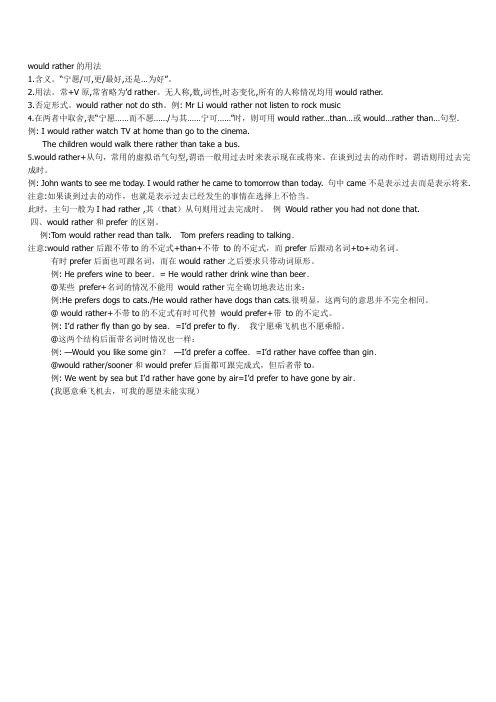
would rather的用法1.含义。
“宁愿/可,更/最好,还是…为好”。
2.用法。
常+V原,常省略为’d rather。
无人称,数,词性,时态变化,所有的人称情况均用would rather.3.否定形式。
would rather not do sth。
例: Mr Li would rather not listen to rock music4.在两者中取舍,表“宁愿……而不愿……/与其……宁可……”时,则可用would rather…than…或would…rather than…句型. 例: I would rather watch TV at home than go to the cinema.The children would walk there rather than take a bus.5.would rather+从句,常用的虚拟语气句型,谓语一般用过去时来表示现在或将来。
在谈到过去的动作时,谓语则用过去完成时。
例: John wants to see me today. I would rather he came to tomorrow than today. 句中came不是表示过去而是表示将来. 注意:如果谈到过去的动作,也就是表示过去已经发生的事情在选择上不恰当。
此时,主句一般为I had rather ,其(that)从句则用过去完成时。
例Would rather you had not done that.四、would rather和prefer的区别。
例:Tom would rather read than talk. Tom prefers reading to talking.注意:would rather后跟不带to的不定式+than+不带to的不定式,而prefer后跟动名词+to+动名词。
有时prefer后面也可跟名词,而在would rather之后要求只带动词原形。
高中英语---would rather用法总结
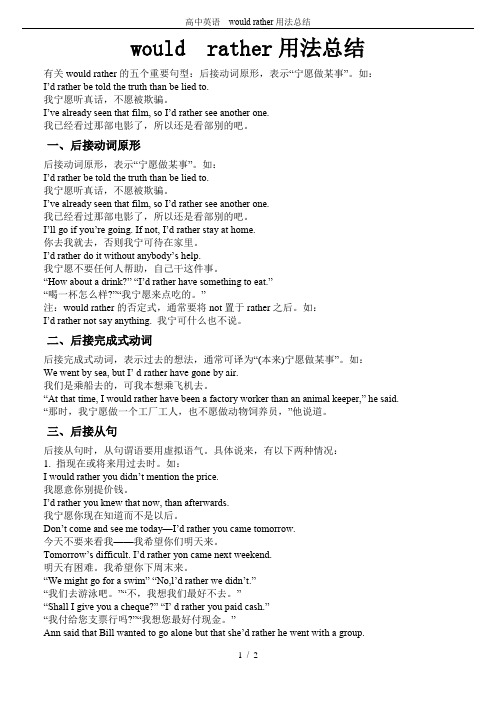
would rather用法总结有关would rather的五个重要句型:后接动词原形,表示“宁愿做某事”。
如:I’d rather be told the truth than be lied to.我宁愿听真话,不愿被欺骗。
I’ve already seen that film, so I’d rather see another one.我已经看过那部电影了,所以还是看部别的吧。
一、后接动词原形后接动词原形,表示“宁愿做某事”。
如:I’d rather be told the truth than be lied to.我宁愿听真话,不愿被欺骗。
I’ve already seen that film, so I’d rather see another one.我已经看过那部电影了,所以还是看部别的吧。
I’ll go if you’re going. If not, I’d rather stay at home.你去我就去,否则我宁可待在家里。
I’d rather do it without anybody’s help.我宁愿不要任何人帮助,自己干这件事。
“How about a drink?” “I’d rather have something to eat.”“喝一杯怎么样?”“我宁愿来点吃的。
”注:would rather的否定式,通常要将not置于rather之后。
如:I’d rather not say anything. 我宁可什么也不说。
二、后接完成式动词后接完成式动词,表示过去的想法,通常可译为“(本来)宁愿做某事”。
如:We went by sea, but I’ d rather have gone by air.我们是乘船去的,可我本想乘飞机去。
“At that time, I would rather have been a factory worker than an animal keeper,” he said. “那时,我宁愿做一个工厂工人,也不愿做动物饲养员,”他说道。
英语词组wouldrather用法最全

英语词组wouldrather用法最全词组would rather的用法1. 表示“宁愿做某事”:(非虚拟语气)记住两个常用的重要的词组:would rather do sthwould rather do sth than do sth= prefer to do rather than do sth例句1:I’d rather stay single to study all my life.我宁愿一辈子不嫁人,也要学医。
例句2:I would rather live an independent life than rely on my parents.= I prefer to live an independent life rather than rely on my parents.我宁愿独立生活也不想依靠我的父母。
2. would rather 表示虚拟语气:would rather 后接从句时,若表示与现在或将来情况相反,从句用一般过去时;若表示与过去情况相反,从句用过去完成时。
例句1:I would rather I worked in a smaller company now.我宁愿现在在一个小公司就职。
(对现在的虚拟)例句2:I’d rather I had gone to the theatre than stayed at home last night.= I’d rather have gone to the theatre than stayed at home last night.我宁愿昨天晚上去看电影而不是呆在家里。
(对过去的虚拟)例句3:I’m not free tomorrow. I’d rather you came next weekend.我明天没空。
我宁愿你下个周末来。
(对将来的虚拟)小检测一.词的适当形式填空:1. He would rather _________(keep) time for his hobbies.2. She would rather ___________(move) to another city than _________(stay) in the present city.3. I would rather she __________(ask) me before borrowing my car.4. I’d rather you __________(pick) her up at the airport tomorrow morning.5. I’d rather you ___________(finish) your homework now. Then we can go out to play basketball.答案:1. keep 2. move, stay 3.had asked 4. picked 5. finished二.同义句转换:1. I would rather I had hired him as my secretary last year.→I would rather ________ _________ him as my secretary last year.2. I would rather go outside than stay at home doing nothing.I __________ __________ go outside rather than stay at home doing nothing.答案:1. have hired 2. prefer to。
wouldrather用法大全
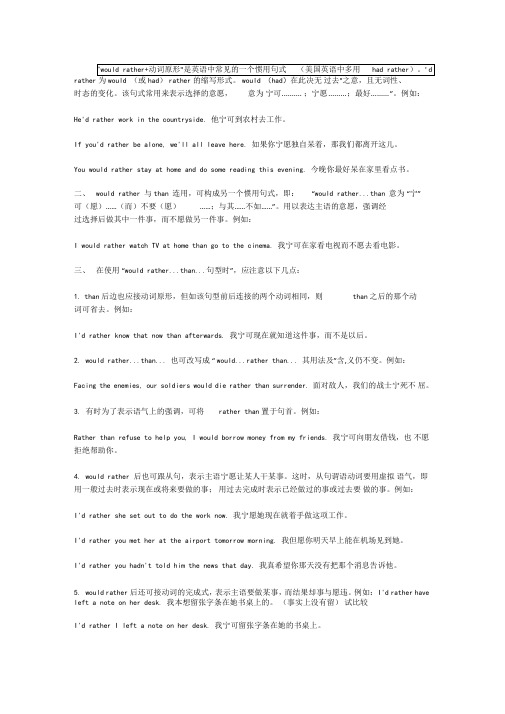
"would rather+动词原形"是英语中常见的一个惯用句式(美国英语中多用had rather)。
' d rather为would (或had)rather的缩写形式。
would (had)在此决无过去"之意,且无词性、时态的变化。
该句式常用来表示选择的意愿,意为宁可.......... ;宁愿......... ;最好......... ”。
例如:He'd rather work in the countryside. 他宁可到农村去工作。
If you'd rather be alone, we'll all leave here. 如果你宁愿独自呆着,那我们都离开这儿。
You would rather stay at home and do some reading this evening. 今晚你最好呆在家里看点书。
二、would rather 与than 连用,可构成另一个惯用句式,即:“would rather...than 意为“宁”可(愿)……(而)不要(愿)……;与其……不如……”。
用以表达主语的意愿,强调经过选择后做其中一件事,而不愿做另一件事。
例如:I would rather watch TV at home than go to the cinema. 我宁可在家看电视而不愿去看电影。
三、在使用“would rather...than...句型时”,应注意以下几点:1.than后边也应接动词原形,但如该句型前后连接的两个动词相同,则than之后的那个动词可省去。
例如:I'd rather know that now than afterwards. 我宁可现在就知道这件事,而不是以后。
2.would rather...than... 也可改写成“ would...rather than... 其用法及”含,义仍不变。
would rather 用法

would rather 用法- Would rather 的基本用法- Would rather 表示“宁愿”,后面跟动词原形或从句。
- Would rather 的否定形式是 would rather not。
- Would rather 可以和 prefer 换用,但 would rather 更口语化。
- Would rather 的用法细节- Would rather 后面的动词原形可以加 to,但加不加都可以。
- Would rather 后面的从句要用虚拟语气,即从句中的动词要用过去式。
- Would rather 后面的从句中要用 should,表示“应该”。
- Would rather 的常见用法- Would rather do sth than do sth:宁愿做某事而不做某事。
- Would rather sb did sth:希望某人做某事。
- Would rather (that) sb did sth than (that) sb did sth:宁愿某人做某事而不是做某事。
- Would rather not do sth:不愿意做某事。
- Would rather 的例句- I would rather stay at home than go out tonight.- He would rather you came with us to the party.- She would rather that you didn't smoke in her house.- We would rather not talk about that right now.- Would rather 的练习题- I _____ stay at home and watch TV tonight. (A. wouldrather B. would like to)- She _____ you didn't smoke in her car. (A. would rather B. would like)- He _____ rather you came to his birthday party. (A. would B. would rather)- We _____ not go to that restaurant again. (A. would rather B. would like)- They _____ rather that you didn't tell anyone about this.(A. would B. would rather)。
初中英语语法wouldrather如何使用

初中英语语法wouldrather如何使用初中英语语法:英语语法大全之would rather用法一: would rather表示"宁愿"would rather dowould rather not dowould rather… than… 宁愿……而不愿。
还有would sooner, had rather, had sooner都表示"宁愿"、"宁可"的.意思。
If I have a choice, I had sooner not continue my studies at this school.I would rather stay here than go home. = I would stay here rather than go home.用法二:would rather后句子用虚拟语气would rather后接句子时,句子谓语习惯上要用虚拟语气,具体用法为:1.一般过去时表示现在或将来的愿望I’d rather y ou went tomorrow (now). 我宁愿你明天(现在)去。
I’d rather you came next Saturday. 我宁愿你下星期六来。
I’d rather you were happy. 我愿你快乐。
I’d rather she sat next to me. 我宁愿她挨着我坐。
I’d rather Jack left on an earlier train. 我宁愿杰克乘前一班火车走。
You always go without me and l’d rather you didn’t. 你总是不带我去,我可不愿意你这样。
“Shall I open the window? ” “I’d rather you didn’t. ”“我要不要把窗子打开? ” “我看不要打开好。
wouldrather的详细用法
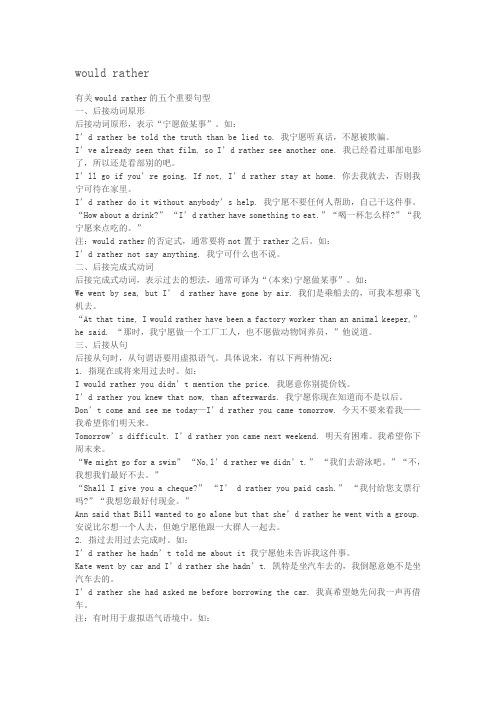
would rather有关would rather的五个重要句型一、后接动词原形后接动词原形,表示“宁愿做某事”。
如:I’d rather be told the truth than be lied to. 我宁愿听真话,不愿被欺骗。
I’ve already seen that film, so I’d rather see another one. 我已经看过那部电影了,所以还是看部别的吧。
I’ll go if you’re going. If not, I’d rather stay at home. 你去我就去,否则我宁可待在家里。
I’d rather do it without anybody’s help. 我宁愿不要任何人帮助,自己干这件事。
“How about a drink?” “I’d rather have something to eat.”“喝一杯怎么样?”“我宁愿来点吃的。
”注:would rather的否定式,通常要将not置于rather之后。
如:I’d rather not say anything. 我宁可什么也不说。
二、后接完成式动词后接完成式动词,表示过去的想法,通常可译为“(本来)宁愿做某事”。
如:We went by sea, but I’ d rather have gone by air. 我们是乘船去的,可我本想乘飞机去。
“At that time, I would rather have been a factory worker than an animal keeper,” he said. “那时,我宁愿做一个工厂工人,也不愿做动物饲养员,”他说道。
三、后接从句后接从句时,从句谓语要用虚拟语气。
具体说来,有以下两种情况:1. 指现在或将来用过去时。
如:I would rather you didn’t mention the price. 我愿意你别提价钱。
知识分享Wouldrather的正确用法
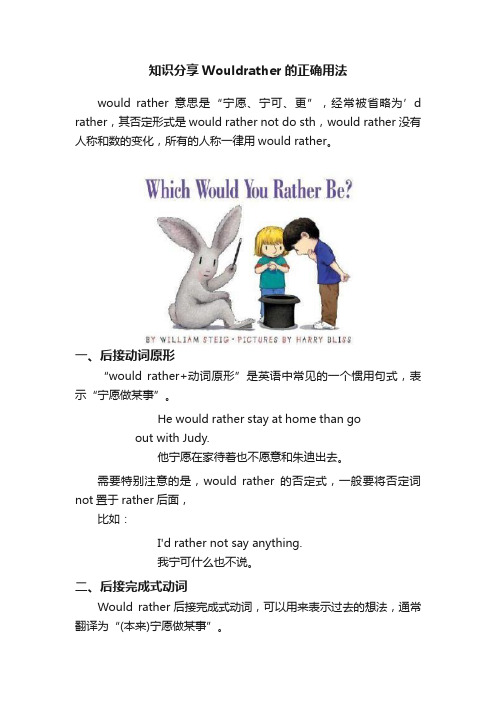
知识分享Wouldrather的正确用法would rather意思是“宁愿、宁可、更”,经常被省略为’d rather,其否定形式是would rather not do sth,would rather没有人称和数的变化,所有的人称一律用would rather。
一、后接动词原形“would rather+动词原形”是英语中常见的一个惯用句式,表示“宁愿做某事”。
He would rather stay at home than goout with Judy.他宁愿在家待着也不愿意和朱迪出去。
需要特别注意的是,would rather的否定式,一般要将否定词not置于rather后面,比如:I'd rather not say anything.我宁可什么也不说。
二、后接完成式动词Would rather后接完成式动词,可以用来表示过去的想法,通常翻译为“(本来)宁愿做某事”。
如:We went by train, but I' d rather havegone by air.我们是坐火车去的,可我本想乘飞机去。
三、后接从句Would rather后接从句时,从句谓语要用虚拟语气。
具体可分为下列两种情况:1. 指现在或将来,则用过去时如:I would rather Jason took it on我宁愿杰森来负责这件事。
“We might go for a trip” “No,l'drather we didn't.”“我们去旅行吧。
”“不,我想我们最好不去。
”2. 指过去,则用过去完成时如:I'd rather he hadn't bought it.我宁愿他从未买过这东西。
四、用于would rather…than…结构这是一个经典的英语结构,它表示“宁愿(做)……而不愿(做)……”,在初中英语阅读题中经常出现。
例句:He would rather keep silence thanadmit to his sins.他宁愿在法庭上沉默也不愿承认他的罪行。
would rather的几种用法(2018年1月7日)
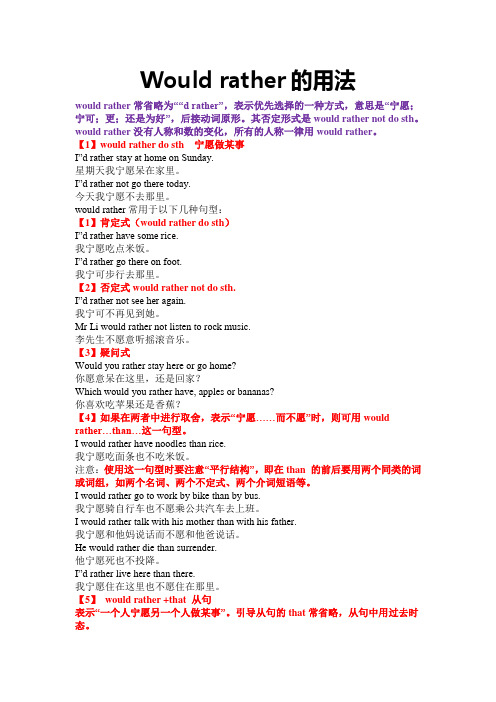
Would rather的用法would rather常省略为““d rather”,表示优先选择的一种方式,意思是“宁愿;宁可;更;还是为好”,后接动词原形。
其否定形式是would rather not do sth。
would rather没有人称和数的变化,所有的人称一律用would rather。
【1】would rather do sth 宁愿做某事I”d rather stay at home on Sunday.星期天我宁愿呆在家里。
I”d rather not go there today.今天我宁愿不去那里。
would rather常用于以下几种句型:【1】肯定式(would rather do sth)I”d rather have some rice.我宁愿吃点米饭。
I”d rather go there on foot.我宁可步行去那里。
【2】否定式would rather not do sth.I”d rather not see her again.我宁可不再见到她。
Mr Li would rather not listen to rock music.李先生不愿意听摇滚音乐。
【3】疑问式Would you rather stay here or go home?你愿意呆在这里,还是回家?Which would you rather have, apples or bananas?你喜欢吃苹果还是香蕉?【4】如果在两者中进行取舍,表示“宁愿……而不愿”时,则可用would rather…than…这一句型。
I would rather have noodles than rice.我宁愿吃面条也不吃米饭。
注意:使用这一句型时要注意“平行结构”,即在than 的前后要用两个同类的词或词组,如两个名词、两个不定式、两个介词短语等。
I would rather go to work by bike than by bus.我宁愿骑自行车也不愿乘公共汽车去上班。
would rather的用法

Would Rather的用法would rather常省略为““d rather”,表示优先选择的一种方式,意思是“宁愿;宁可;更;还是为好”,后接动词原形。
其否定形式是would rather not do sth。
would rather没有人称和数的变化,所有的人称一律用would rather。
例如:I”d rather stay at home on Sunday.星期天我宁愿呆在家里。
I”d rather not go there today.今天我宁愿不去那里。
would rather常用于以下几种句型:1. 肯定式(would rather do sth)I”d rather have some rice.我宁愿吃点米饭。
I”d rather go there on foot.我宁可步行去那里。
2. 否定式would rather not do sth.I”d rather not see her again.我宁可不再见到她。
Mr Li would rather not listen to rock music.李先生不愿意听摇滚音乐。
3. 疑问式Would you rather stay here or go home?你愿意呆在这里,还是回家?Which would you rather have, apples or bananas?你喜欢吃苹果还是香蕉?4. 如果在两者中进行取舍,表示“宁愿……而不愿”时,则可用would rather…than…这一句型。
例如:I would rather have noodles than rice.我宁愿吃面条也不吃米饭。
注意:使用这一句型时要注意“平行结构”,即在than 的前后要用两个同类的词或词组,如两个名词、两个不定式、两个介词短语等。
例如:I would rather go to work by bike than by bus.我宁愿骑自行车也不愿乘公共汽车去上班。
would rather的五个重要句型

would rather的五个重要句型一、后接动词原形后接动词原形,表示“宁愿做某事”。
如:I'd rather be told the truth than be lied to. 我宁愿听真话,不愿被欺骗。
I've already seen that film, so I'd rather see another one. 我已经看过那部电影了,所以还是看部别的吧。
I'll go if you're going. If not, I'd rather stay at home. 你去我就去,否则我宁可待在家里。
I'd rather do it without anybody's help. 我宁愿不要任何人帮助,自己干这件事。
“How about a drink?” “I'd rather have something to eat.”“喝一杯怎么样?”“我宁愿来点吃的。
”注:would rather的否定式,通常要将not置于rather之后。
如:I'd rather not say anything. 我宁可什么也不说。
二、后接完成式动词后接完成式动词,表示过去的想法,通常可译为“(本来)宁愿做某事”。
如:We went by sea, but I' d rather have gone by air. 我们是乘船去的,可我本想乘飞机去。
“At that time, I would rather have been a factory worker than an animal keeper,” he said. “那时,我宁愿做一个工厂工人,也不愿做动物饲养员,”他说道。
三、后接从句后接从句时,从句谓语要用虚拟语气。
具体说来,有以下两种情况:1.指现在或将来用过去时。
如:I would rather you didn't mention the price. 我愿意你别提价钱。
英语基础知识积累-would rather的用法
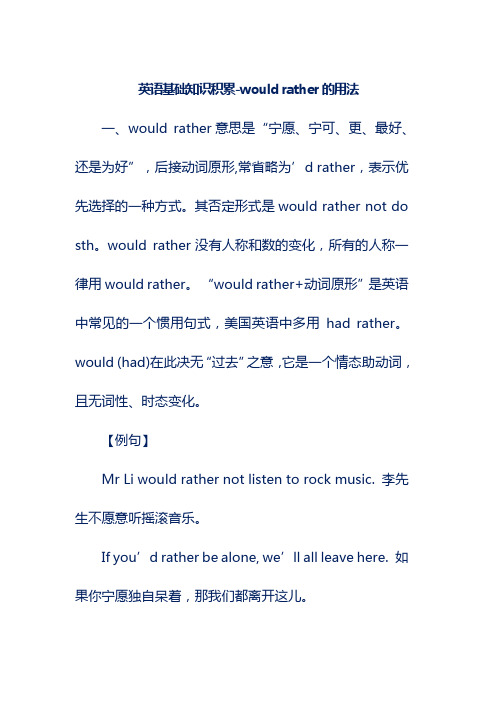
英语基础知识积累-would rather的用法一、would rather意思是“宁愿、宁可、更、最好、还是为好”,后接动词原形,常省略为’d rather,表示优先选择的一种方式。
其否定形式是would rather not do sth。
would rather没有人称和数的变化,所有的人称一律用would rather。
“would rather+动词原形”是英语中常见的一个惯用句式,美国英语中多用had rather。
would (had)在此决无“过去”之意,它是一个情态助动词,且无词性、时态变化。
【例句】Mr Li would rather not listen to rock music. 李先生不愿意听摇滚音乐。
If you’d rather be alone, we’ll all leave here. 如果你宁愿独自呆着,那我们都离开这儿。
He’d rather work in the countryside. 她宁可到农村去工作。
You would rather stay at home and do some reading this evening. 今晚你最好呆在家中读点书。
二、如果在两者中进行取舍,表示“宁愿……而不愿……,与其……宁可……”的意思时,则可用would rather…than…或would…rather than…的句型。
【例句】I would rather watch TV at home than go to the cinema. 我宁可在家看电视而不愿去看电影。
The children would walk there rather than take a bus. 孩子们宁愿步行去那里而不愿乘公共汽车。
请注意:1) would rather…than…/would…rather than…也可以颠倒为:rather than…would…。
有关would rather的五个重要句型_高中英语语法 英语语法.doc

有关would rather的五个重要句型_高中英语语法一、后接动词原形后接动词原形,表示宁愿做某事。
如:I’d rather be told the truth than be lied to. 我宁愿听真话,不愿被欺骗。
I’ve already seen that film, so I’d rather see another one. 我已经看过那部电影了,所以还是看部别的吧。
I’ll go if you’re going. If not, I’d rather stay at home. 你去我就去,否则我宁可待在家里。
I’d rather do it without anybody’s help. 我宁愿不要任何人帮助,自己干这件事。
How about a drink? I’d rather have something to eat.喝一杯怎么样?我宁愿来点吃的。
注:would rather的否定式,通常要将not置于rather之后。
如:I’d rather not say anything. 我宁可什么也不说。
二、后接完成式动词后接完成式动词,表示过去的想法,通常可译为(本来)宁愿做某事。
如:We went by sea, but I’ d rather have gone by air. 我们是乘船去的,可我本想乘飞机去。
At that time, I would rather have been a factory worker than an animal keeper, he said. 那时,我宁愿做一个工厂工人,也不愿做动物饲养员,他说道。
三、后接从句后接从句时,从句谓语要用虚拟语气。
具体说来,有以下两种情况:1. 指现在或将来用过去时。
如:I would rather you didn’t mention the price. 我愿意你别提价钱。
I’d rather you knew that now, than afterwards. 我宁愿你现在知道而不是以后。
高考英语句型核心语法:wouldrather句型

【导语】锲⽽舍之,朽⽊不折;锲⽽不舍,⾦⽯可镂。
备考也需要这样持之以恒的精神。
⽆忧考为您提供⾼考英语句型核⼼语法,巩固所学知识并灵活运⽤,考试时会更得⼼应⼿,快来看看吧!【篇⼀】⾼考英语句型核⼼语法 would rather句型 (1) would rather do sth than do sth 宁愿做……⽽不愿做…… 例:She would rather die than turn against his motherland. 她宁可死也不去背叛祖国。
(2) would rather have done sth 宁愿过去做过某事 例:I would rather have taken his advice. 我宁愿过去接受他的意见。
(3) would rather sb had done sth 宁愿某⼈过去做过某事 例:I would rather I had passed the examination last week. 我真希望通过上星期的考试。
(4) would rather sb did sth 宁愿某⼈现在或将来做某事 例:Who would you rather went with you? 你宁愿谁和你⼀起去?【篇⼆】⾼考英语句型核⼼语法 before句型 (1) before sb can/ could … 某⼈还没来得及…… 例:Before I could get in a word ,he had measured me. 我还没来得及插话,他就给我量好了尺⼨。
(2) It will be +时间+ before + 还有多长时间…… 例:It will be 4 years before he graduates. 他还有四年时间变毕业了。
(3) had done some time before (才……) 例:We had sailed four days and four nights before we saw land. 我们航⾏了四天四夜才见到陆地。
would-rather的五个重要句型
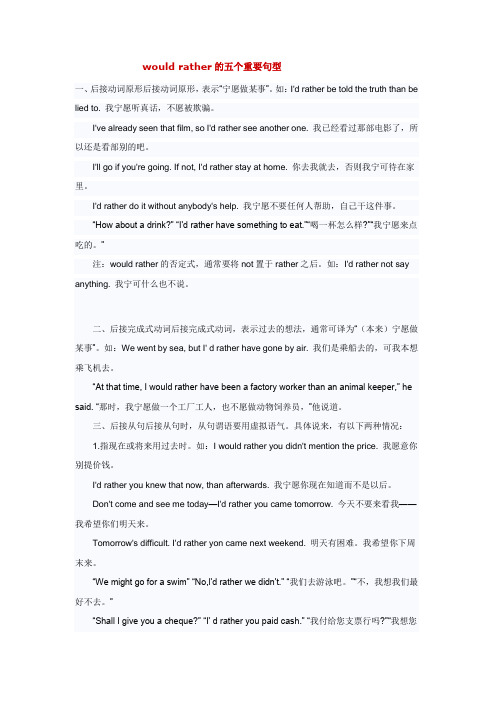
would rather的五个重要句型一、后接动词原形后接动词原形,表示“宁愿做某事”。
如:I'd rather be told the truth than be lied to. 我宁愿听真话,不愿被欺骗。
I've already seen that film, so I'd rather see another one. 我已经看过那部电影了,所以还是看部别的吧。
I'll go if you're going. If not, I'd rather stay at home. 你去我就去,否则我宁可待在家里。
I'd rather do it without anybody's help. 我宁愿不要任何人帮助,自己干这件事。
“How about a drink?” “I'd rather have something to eat.”“喝一杯怎么样?”“我宁愿来点吃的。
”注:would rather的否定式,通常要将not置于rather之后。
如:I'd rather not say anything. 我宁可什么也不说。
二、后接完成式动词后接完成式动词,表示过去的想法,通常可译为“(本来)宁愿做某事”。
如:We went by sea, but I' d rather have gone by air. 我们是乘船去的,可我本想乘飞机去。
“At that time, I would rather have been a factory worker than an animal keeper,” he said. “那时,我宁愿做一个工厂工人,也不愿做动物饲养员,”他说道。
三、后接从句后接从句时,从句谓语要用虚拟语气。
具体说来,有以下两种情况:1.指现在或将来用过去时。
如:I would rather you didn't mention the price. 我愿意你别提价钱。
would rather语法

“would rather do sth.”是英语中常见的一个固定惯用句式(美国英语中多用had rather)。
would(或had)rather的缩写形式为’d rather。
would (had) rather中的would并无过去的意思。
该句式常用来表示选择的意愿,意谓“宁可……”、“宁愿……”、“最好……”。
例如:He’d rather work in the countryside. 她宁可到农村去工作。
If you’d rather be alone, we’ll all leave here. 如果你宁愿独自呆着,那我们都离开这儿。
You would rather stay at home and do some reading this evening. 今晚你最好呆在家中读点书。
would rather与than连用,可构成另一个惯用句式,即:“would rather...than....”,意谓“宁可(愿)……(而)不要(愿)……”、“与其……不如……”。
用以表达主语的意愿,强调经过选择后做其中一件事,而不愿做另一件事。
例如:I would rather watch TV at home than go to the cinema. 我宁可在家看电视而不愿去看电影。
The children would rather walk there than take a bus. 孩子们宁愿步行去那里而不乘公共汽车。
在使用“would rather...than...”句型时,应注意以下几点:1. than 后边也应接动词原形,但如该句型前后连接的两个动词相同,则than之后的那个动词可省去。
例如:I’d rather you know that now than afterwards. 我宁可你现在就知道这件事,而不是以后。
2. would rather...than...也可改写“would...rather than...”,其用法及含义仍不变。
- 1、下载文档前请自行甄别文档内容的完整性,平台不提供额外的编辑、内容补充、找答案等附加服务。
- 2、"仅部分预览"的文档,不可在线预览部分如存在完整性等问题,可反馈申请退款(可完整预览的文档不适用该条件!)。
- 3、如文档侵犯您的权益,请联系客服反馈,我们会尽快为您处理(人工客服工作时间:9:00-18:30)。
“would rather do sth.”是英语中常见的一个固定惯用句式(美国英语中多用had rather)。
would(或had)rather的缩写形式为’d rather。
would (had) rather中的would并无过去的意思。
该句式常用来表示选择的意愿,意谓“宁可……”、“宁愿……”、“最好……”。
例如:He’d rather work in the countryside. 她宁可到农村去工作。
If you’d rather be alone, we’ll all leave here. 如果你宁愿独自呆着,那我们都离开这儿。
You would rather stay at home and do some reading this evening. 今晚你最好呆在家中读点书。
would rather与than连用,可构成另一个惯用句式,即:“would rather...than....”,意谓“宁可(愿)……(而)不要(愿)……”、“与其……不如……”。
用以表达主语的意愿,强调经过选择后做其中一件事,而不愿做另一件事。
例如:I would rather watch TV at home than go to the cinema. 我宁可在家看电视而不愿去看电影。
The children would rather walk there than take a bus. 孩子们宁愿步行去那里而不乘公共汽车。
在使用“would rather...than...”句型时,应注意以下几点:1. than 后边也应接动词原形,但如该句型前后连接的两个动词相同,则than之后的那个动词可省去。
例如:I’d rather you know that now than afterwards. 我宁可你现在就知道这件事,而不是以后。
2. would rather...than...也可改写“would...rather than...”,其用法及含义仍不变。
例如:Facing the enemies, our soldiers would die rather than surrender. 面对敌人,我们的战士宁死不屈。
3. 有时,为了表示语气上的强调,还可将rather than置于句首,例如:Rather than refuse to help you, I would borrow money from my friends. 我宁可向朋友借钱,也不愿拒绝帮助你。
4. would rather后可跟从句,表示主语宁愿让某人干某事。
从句谓语动词用虚拟语气,即用一般过去时表示现在或将来要做的事;用过去完成时表示过去要做的事。
如:I’d rather she set out to do the work now. 我宁愿她现在就着手做这项工作。
I’d rather you met her at the airport tomorrow morning. 但愿你明天早上能在机场见到她。
I’d rather you hadn’t told him the news that day.我真希望你那天没有把那消息告诉他。
5. would rather后接动词的完成式,表示主语要做某事,而结果事与愿违的意思。
例如:I’d rather have left a note on her desk. 我本想留张字条在她书桌上的。
(事实上没有留)比较:I’d rather I left a note on her desk. 我宁可留张字条在她的书桌上。
一、would rather意思是“宁愿、宁可、更、最好、还是为好”,后接动词原形,常省略为’d rather,表示优先选择的一种方式。
其否定形式是would rather not do sth。
would rather没有人称和数的变化,所有的人称一律用would rather。
“would rather+动词原形”是英语中常见的一个惯用句式,美国英语中多用had rather。
would (had)在此决无“过去”之意,它是一个情态助动词,且无词性、时态变化。
【例句】Mr Li would rather not listen to rock music. 李先生不愿意听摇滚音乐。
If you’d rather be alone, we’ll all leave here. 如果你宁愿独自呆着,那我们都离开这儿。
He’d rather work in the countryside. 她宁可到农村去工作。
You would rather stay at home and do some reading this evening. 今晚你最好呆在家中读点书。
二、如果在两者中进行取舍,表示“宁愿……而不愿……,与其……宁可……”的意思时,则可用would rather…than…或would…rather than…的句型。
【例句】I would rather watch TV at home than go to the cinema. 我宁可在家看电视而不愿去看电影。
The children would walk there rather than take a bus. 孩子们宁愿步行去那里而不愿乘公共汽车。
请注意:1)would rather…than…/would…rather than…也可以颠倒为:rather than…would…。
Would(rather)和than后都接不带to的动词不定式,若选用的动词相同,那么than 后的动词可以省略。
例I would rather have noodles than rice. 我宁愿吃面条也不吃米饭。
He would rather drink wine than beer.他喜欢喝红葡萄酒而不喜欢喝啤酒。
Rather than work in such bad condition, he would give up. 与其在这样差的条件下工作,他宁愿放弃。
2)使用would rather…than…句型时要注意“平行结构”,即在than 的前后要用两个同类的词或词组,如两个名词、两个不定式、两个介词短语等。
例I would rather go to work by bike than by bus. 我宁愿骑自行车也不愿乘公共汽车去上班。
I would rather talk with his mother than with his father. 我宁愿和他妈说话而不愿和他爸说话。
三、在疑问句式中,would rather 与would rather…than…中的would要放在主语之前。
【例句】Would you rather stay here or go home? 你愿意呆在这里,还是回家?Which would you rather have, apples or bananas? 你喜欢吃苹果还是香蕉?Would you rather read a novel than read a poem?你宁愿看小说而不愿朗读诗歌吗?四、would rather+从句,是一个常用的虚拟语气句型Would rather+从句,谓语一般用过去时来表示现在或将来。
其意为“宁愿……,还是……好些”“一个人宁愿另一个人做某事”。
引导从句的that常省略。
在谈到过去的动作时,谓语则用过去完成时。
【例句】John wants to see me today. I would rather he came to tomorrow than today. 约翰今天想去看我。
我宁愿他明天来看我而不是今天。
(句中came不是表示过去而是表示将来) We’d rather he paid us the money tomorrow. 我们宁愿他明天付给我们那笔钱。
Don’t come tomorrow. I’d rather you came next weekend. 明天别来。
我希望你下周末来。
请注意:1)如果谈到过去的动作,也就是表示过去已经发生的事情在选择上不恰当。
此时,主句一般为I had rather ,其(that)从句则用过去完成时。
【例句】Would rather you had not done that. 我真希望你没有做那件事。
2)如果只涉及主语本人而不涉及另一个人,则would rather之后不接that从句而接have done结构。
【例句】I would rather have gone to the theatre than stayed home night. 我真希望昨天晚上去看了戏而不是呆在家里。
He would rather be poor than have got money by dishonest methods.他宁可穷也不愿意用不诚实的手段获取金钱。
Henry would rather that his girlfriend worked in the same department as he does.亨利希望他的女朋友和他在一个部门工作。
五、would rather/sooner和prefer/would prefer的区别would rather和would sooner之间一般没有区别,但经常接触到的是would rather。
【例句】Tom would rather/sooner read than talk.汤姆宁可读书而不愿谈天。
Tom prefers reading to talking.汤姆喜欢读书而不喜欢谈天。
请注意:1)would rather后跟不带to的不定式+than+不带to的不定式,而prefer后跟动名词+to+动名词。
有时prefer后面也可跟名词,而在would rather之后要求只带动词原形。
【例句】He prefers wine to beer.= He would rather drink wine than beer.他喜欢喝红葡萄酒而不喜欢喝啤酒。
I prefer tennis to golf.= I’d rather play tennis than golf.我喜欢打网球而不喜欢打高尔夫球。
2)某些prefer+名词的情况不能用would rather完全确切地表达出来:【例句】He prefers dogs to cats.(他喜欢狗而不喜欢猫。
)和He would rather have dogs than cats.(他宁可养狗而不愿养猫。
